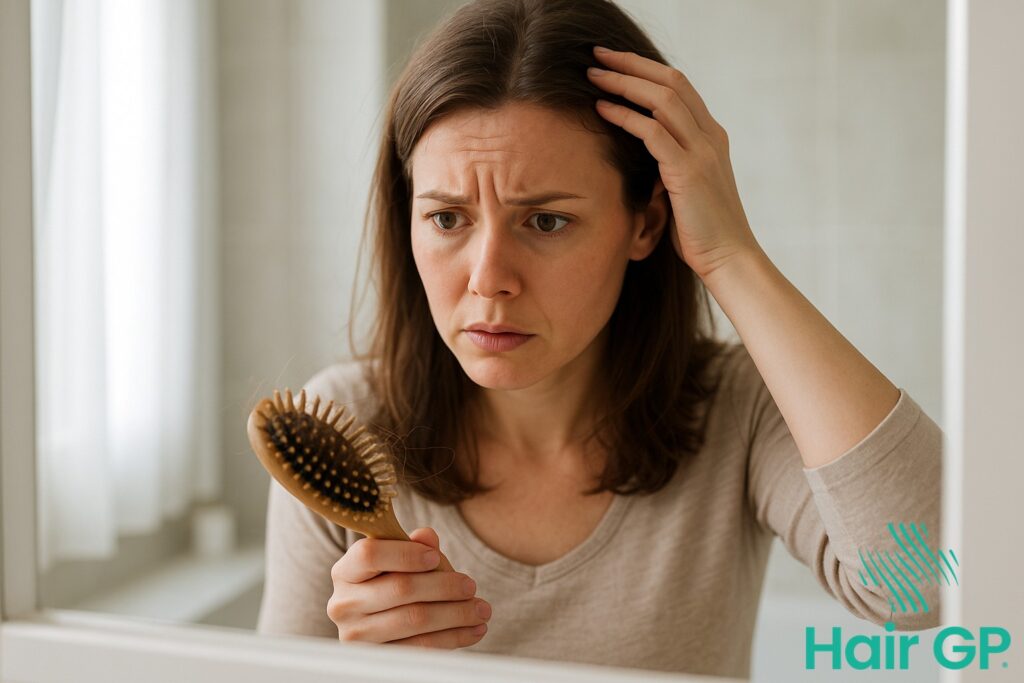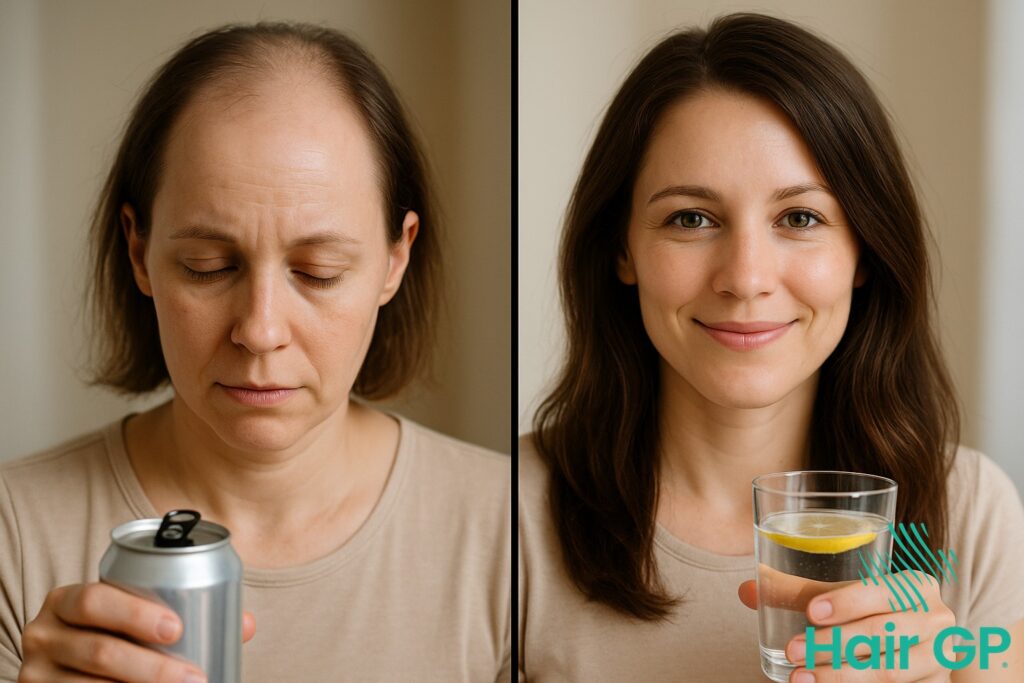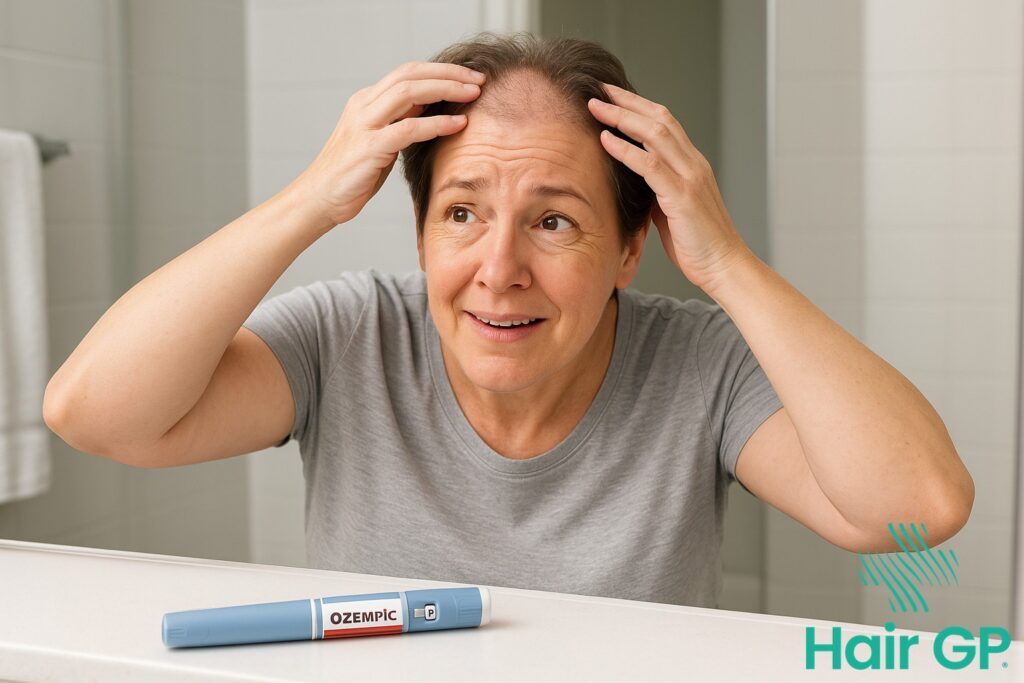Introduction
If you’re experiencing hair loss whilst following a ketogenic diet, you’re not alone. Many people notice increased hair shedding after starting their low carb diet journey, leaving them concerned about whether their new eating plan is worth the trade-off. The good news is that keto-related hair loss is typically temporary and manageable with the right approach.
The ketogenic diet has gained immense popularity for its weight loss and health benefits, but the connection between this low-carb lifestyle and hair thinning often catches dieters by surprise. Understanding why certain dietary changes can cause hair loss is crucial for anyone considering or currently following a keto diet.
This comprehensive guide explores the science behind why ketogenic diets sometimes trigger hair shedding, helping you distinguish between keto-related hair loss and other potential causes. We’ll examine the different types of hair loss associated with low-carb eating, provide a realistic timeline for when shedding typically begins and ends, and most importantly, share evidence-based strategies to prevent and treat this common side effect.
Whether you’re already experiencing hair loss on keto or want to prevent it from happening, you’ll discover practical solutions including optimal food choices, supplementation strategies, and treatment options. We’ll also help you recognise when professional medical advice is necessary, ensuring you can continue your keto journey whilst maintaining healthy, vibrant hair. Armed with this knowledge, you can make informed decisions about your diet and hair health.
Key Takeaways – TL/DR
- Keto-related hair loss is usually temporary and peaks 2-3 months after starting the diet
- Calorie restriction, nutrient deficiencies, and rapid weight loss are the main culprits
- Most people recover their hair within 6-12 months with proper nutrition
- Protein intake, biotin, and iron are critical for preventing keto hair loss
- Gradual weight loss and balanced nutrition can minimize hair shedding
What Is Keto Hair Loss?
Keto hair loss refers to the increased hair shedding that some people experience when following a ketogenic diet. This phenomenon typically occurs within the first few months of starting your low-carb journey and is characterised by more hair than usual falling out during washing, brushing, or throughout the day. Unlike pattern baldness or alopecia, keto hair loss is a form of temporary hair loss known as telogen effluvium.
When your body undergoes significant dietary changes, such as switching to a ketogenic diet, it can trigger a stress response that pushes more hair follicles into the resting phase of their growth cycle. This results in noticeable hair shedding approximately two to three months after the initial dietary change. The hair loss is typically diffuse, meaning it affects the entire scalp rather than creating bald patches or receding hairlines.
To determine if your hair loss is keto-related, consider the timing – did it begin within a few months of starting your diet? Additionally, keto hair loss is usually temporary, lasting three to six months before resolving naturally. If you’re experiencing sudden onset hair loss with other symptoms or localised balding, it’s worth consulting a healthcare professional to rule out other causes.
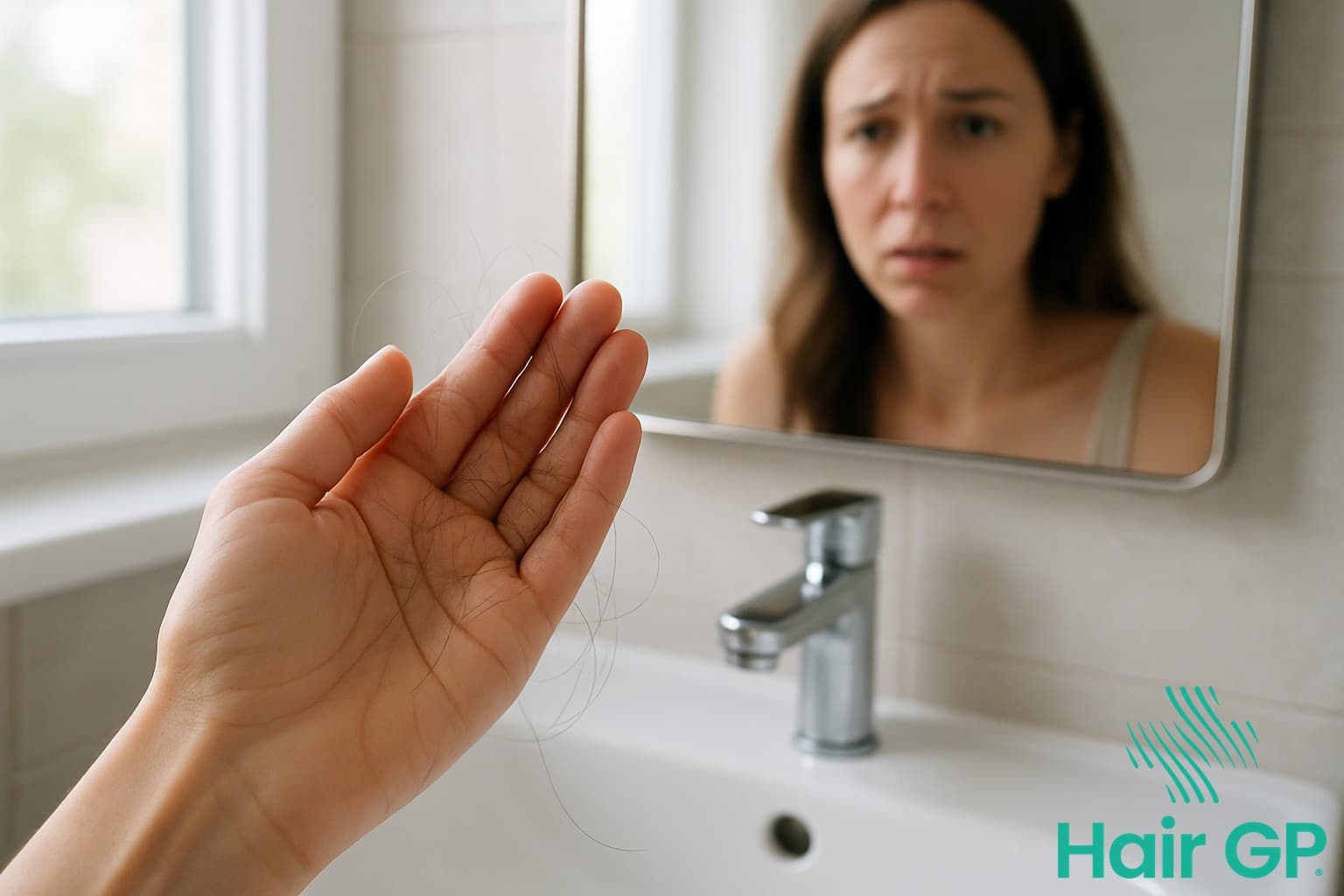
Why Does Keto Cause Hair Loss? The Science Explained
The ketogenic diet can cause hair loss through several interconnected biological mechanisms that disrupt the normal hair growth cycle. Understanding these scientific reasons helps explain why many people experience temporary hair shedding when entering ketosis, and why this phenomenon typically resolves with proper management.
Calorie Restriction and Metabolic Stress
When you drastically reduce calories during keto adaptation, your body enters a metabolic shock response that prioritises essential functions over hair growth. This energy conservation mode redirects nutrients away from hair follicles, pushing them into premature dormancy [1]. The sudden shift in metabolism triggers a stress response that can interrupt the anagen (growth) phase of the hair growth cycle, leading to increased shedding within 2-3 months of starting the diet.
Nutrient Deficiencies on Keto
Several nutrient deficiencies commonly occur on ketogenic diets and directly impact hair health. Protein insufficiency is particularly problematic, as hair follicles require adequate amino acids for keratin production. Many people inadvertently reduce protein intake whilst focusing on high fat consumption. Biotin deficiency also frequently develops, as this B-vitamin is crucial for hair growth and is often lacking in very low carb diets. Additionally, iron and zinc depletion can occur when red meat consumption is limited or absorption is impaired, both minerals being essential for healthy hair follicles [2].
Rapid Weight Loss Impact
Quick weight loss, common during initial ketosis, creates hormonal changes that trigger telogen effluvium – a condition where hair follicles prematurely enter the resting phase [3]. This stress and hair loss connection is well-documented in medical literature. During rapid weight loss, the body mobilises stored nutrients, creating temporary imbalances that affect hair growth. Hormonal fluctuations, particularly in thyroid hormones and cortisol levels, further compound the issue. The body perceives rapid weight loss as a stressor, activating survival mechanisms that deprioritise hair growth in favour of maintaining vital organ functions.
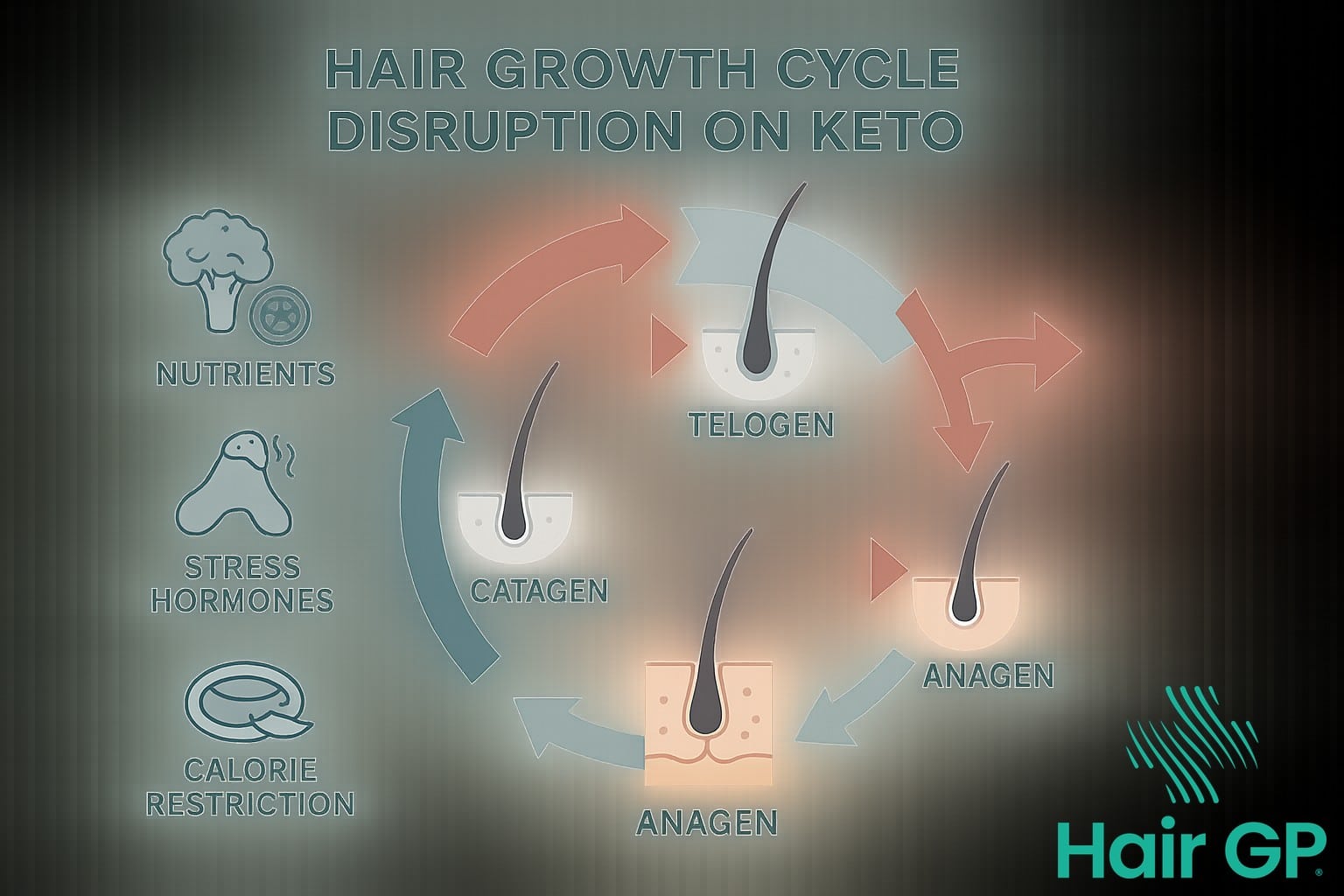
Types of Hair Loss Associated with Keto
When following a ketogenic diet, several distinct types of hair loss may occur, each with different causes and recovery timelines. Understanding these patterns helps identify appropriate treatment strategies and set realistic expectations for hair regrowth.
Telogen Effluvium: The Most Common Type
Telogen effluvium represents the primary form of sudden hair loss experienced by keto dieters, characterised by temporary diffuse hair thinning across the scalp. This reversible condition occurs when metabolic stress pushes hair follicles prematurely into the resting phase, resulting in increased shedding typically 2-3 months after the triggering event. Unlike permanent forms of alopecia or pattern baldness, full recovery is expected once the underlying stress resolves, with most individuals experiencing complete regrowth within six months.
Nutritional Hair Loss
Specific nutrient deficiencies can trigger distinct patterns of hair thinning on keto. Protein deficiency may cause brittle, lacklustre hair that breaks easily, whilst iron deficiency often presents as diffuse thinning with pale scalp appearance. Biotin insufficiency, sometimes exacerbated by raw egg white consumption, can lead to progressive hair loss alongside skin changes. Unlike telogen effluvium, nutritional hair loss may worsen progressively without intervention, though it’s equally reversible once deficiencies are corrected. Distinguishing nutritional causes from androgenetic alopecia requires careful assessment of dietary intake and laboratory testing.
Timeline: When Does Keto Hair Loss Start and Stop?
When starting keto, understanding the timeline of temporary hair loss can help ease concerns and set realistic expectations. Hair falling typically begins two to three months after initiating the diet, as the initial dietary shock triggers telogen effluvium. This delay occurs because hair already in the growing phase must complete its cycle before entering the shedding phase.
The most noticeable hair loss usually peaks between months three and four, with many dieters reporting increased hair in their shower drains and brushes during this period. Whilst alarming, this shock hair loss is temporary and part of your body’s adjustment process.
Recovery begins naturally around month five or six, as new hair growth starts replacing the shed strands. Most people experience complete regrowth within six to nine months of starting keto, with hair often returning thicker and healthier than before. Remember, this timeline varies between individuals based on factors like nutritional status, stress levels, and overall health.
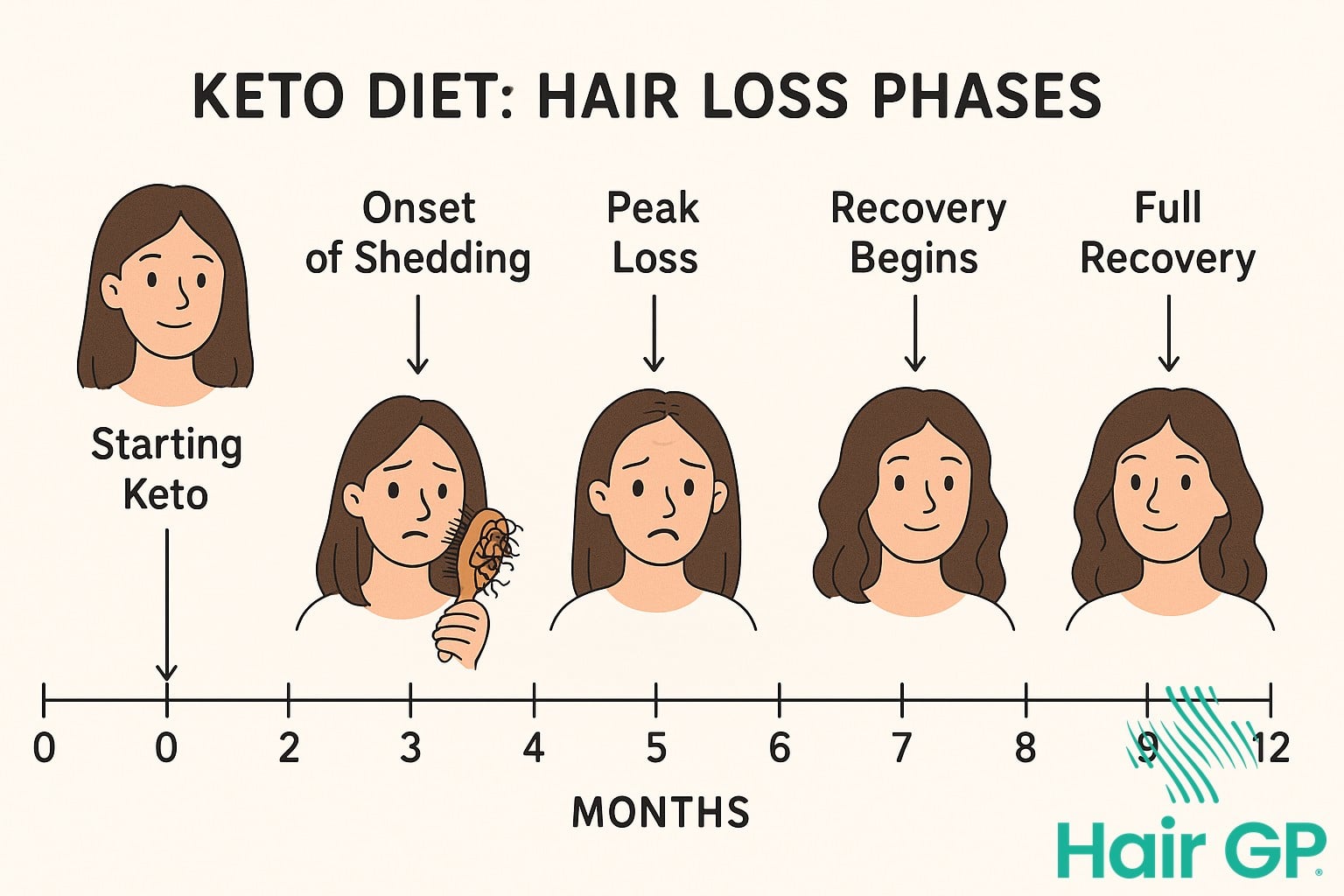
How to Prevent Hair Loss on Keto
Whilst keto-related hair loss can be concerning, implementing strategic nutritional and lifestyle modifications can effectively prevent hair loss and maintain healthy hair throughout your low-carb journey. By focusing on adequate protein intake, targeted supplementation, and gradual metabolic adaptation, you can support hair growth whilst enjoying the benefits of ketosis.
Optimise Your Protein Intake
Hair consists primarily of keratin, a structural protein requiring adequate dietary protein for synthesis. Aim for 1g of protein per pound of body weight to ensure your follicles receive sufficient building blocks. Choose complete protein sources from keto friendly foods like grass-fed beef, wild-caught salmon, and organic eggs. Consider adding collagen supplementation, particularly marine collagen, which provides specific amino acids crucial for hair structure. Distribute protein intake evenly throughout the day to maintain consistent amino acid availability for optimal hair health.
Essential Supplements for Hair Health
Strategic supplementation can significantly support hair growth during ketosis. Iron deficiency commonly triggers hair loss, so consider iron supplementation paired with vitamin C for enhanced absorption. Include zinc (15-30mg) and selenium (200mcg) to maintain proper thyroid function and cellular metabolism within hair follicles. These micronutrients work synergistically to prevent hair loss whilst supporting overall metabolic health.
Gradual Calorie Reduction
Avoiding metabolic shock is crucial for maintaining healthy hair during keto adaptation. Limit calorie deficits to a maximum of 20% below maintenance to prevent stress-induced shedding. Implement weekly refeed days with slightly higher calories to reassure your body that resources are available. Incorporate stress management techniques like meditation, yoga, or gentle exercise, as cortisol elevation can exacerbate hair loss regardless of diet.
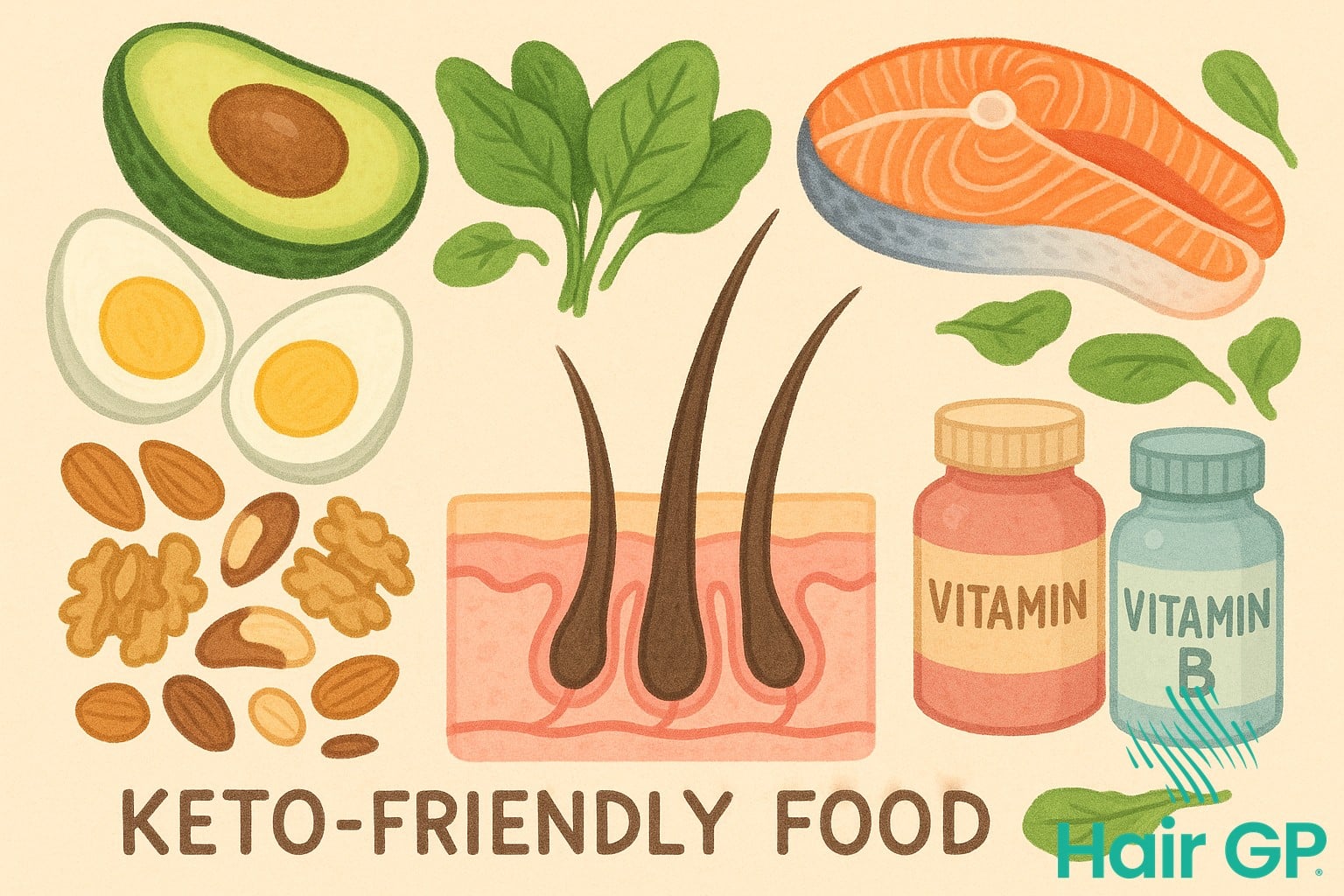
Best Keto Foods for Healthy Hair
Incorporating specific keto friendly foods into your high fat diet can significantly support healthy hair growth whilst maintaining ketosis. Protein-rich foods form the foundation, as hair follicles consist primarily of keratin, a structural protein. Fatty fish like salmon, mackerel, and sardines provide both omega-3 fatty acids and quality protein to promote hair growth. Eggs offer complete proteins alongside biotin and vitamin D, essential nutrients for developing more hair strands.
Avocados deliver healthy monounsaturated fats plus vitamins E and C, which protect hair follicles from oxidative stress. Nuts and seeds, particularly almonds, walnuts, and flaxseeds, supply zinc, selenium, and vitamin E whilst fitting perfectly into ketogenic macros. Dark leafy greens like spinach and kale provide iron and folate, crucial for oxygen delivery to hair follicles.
Bone broth represents an excellent source of collagen and amino acids that strengthen hair structure. Full-fat Greek yoghurt offers protein and B vitamins, whilst aged cheeses provide calcium and vitamin A. Incorporating organ meats like liver supplies concentrated nutrients including iron, vitamin A, and B-complex vitamins. These nutrient-dense selections ensure your body receives essential building blocks for maintaining lustrous, healthy hair throughout your ketogenic journey.
Treatment Options for Keto Hair Loss
Effective treatment for keto-related hair loss combines targeted nutritional adjustments with evidence-based topical interventions. Whilst most cases resolve naturally, implementing specific strategies can accelerate recovery and promote hair growth during the adaptation phase.
Nutritional Interventions
Addressing nutritional deficiencies forms the cornerstone of reversing thinning hair on keto. Moderately increasing caloric intake by 200-300 calories daily helps reduce metabolic stress whilst maintaining ketosis. Strategic protein timing throughout the day ensures consistent amino acid availability for healthy hair growth. Focus on micronutrient-dense foods including leafy greens, fatty fish, and organ meats to support hair growth naturally. Biotin supplementation may benefit those with documented deficiency, though evidence remains limited for general use [4].
Topical and Medical Treatments
For persistent hair loss, clinical interventions offer additional support. Minoxidil 2% or 5% solution applied twice daily (once daily for women) demonstrates significant efficacy in promoting hair regrowth [5]. Regular scalp massage improves circulation and may enhance treatment effectiveness. Severe or prolonged cases warrant a consultation with a specialist hair Doctor to rule out underlying conditions beyond dietary factors. Combining medical treatments with nutritional optimisation typically yields the best outcomes for restoring healthy hair growth.
When to See a Doctor About Keto Hair Loss
Whilst some hair loss during ketosis is typically temporary, certain signs warrant professional medical evaluation. If you’re losing hair in patches, experiencing scalp pain or inflammation, or noticing increased hair loss persisting beyond three months despite dietary adjustments, consult your GP or a dermatologist. Additionally, seek medical advice if hair thinning is accompanied by unexplained weight loss, extreme fatigue, or skin changes.
Your doctor can distinguish between keto-related telogen effluvium and underlying conditions like androgenetic alopecia or male pattern baldness through blood tests and scalp examination. They’ll assess thyroid function, iron levels, and hormonal balance to rule out other causes of potential hair loss. During consultation, provide details about your diet changes, supplements, and timeline of symptoms. Medical professionals can prescribe targeted treatments if necessary and determine whether your hair loss pattern suggests temporary dietary adjustment or requires ongoing management.
Conclusion
Understanding the relationship between the ketogenic diet and hair loss empowers you to address this temporary concern effectively. Whilst the keto diet can trigger hair loss through various mechanisms—including rapid weight loss, nutritional deficiencies, and metabolic stress—it’s crucial to remember that this shedding is typically reversible. The key to maintaining healthy hair whilst following a ketogenic lifestyle lies in proper nutritional planning, adequate protein intake, and strategic supplementation when necessary.
If you’re experiencing diet and hair loss, take heart knowing that most individuals see significant improvement within three to six months of addressing underlying causes. Focus on consuming nutrient-dense foods, maintaining appropriate caloric intake, and monitoring your micronutrient levels. Consider working with healthcare professionals who understand both ketogenic nutrition and hair health to develop a personalised approach.
Remember, the benefits of a well-formulated ketogenic diet often outweigh temporary setbacks like hair loss. By implementing the strategies discussed throughout this guide—from optimising protein intake to managing stress levels—you can successfully navigate this transition period whilst supporting overall health. Your commitment to understanding and addressing keto-related hair loss demonstrates a balanced approach to wellness that will serve you well on your ketogenic journey.
Frequently Asked Questions
No, keto-related hair loss is typically temporary. Most people experience telogen effluvium, which resolves within 6-12 months once the body adapts to the diet or nutritional deficiencies are corrected.
Losing 50-100 hairs daily is normal. On keto, this may increase to 150-300 hairs daily during peak shedding. If you’re losing clumps or developing bald patches, consult a doctor.
Yes, you can minimize hair loss by ensuring adequate protein intake (1g per pound body weight), avoiding extreme calorie deficits, supplementing with multivitamin containing iron, and losing weight gradually.
Not necessarily. First, evaluate your calorie intake, protein consumption, and nutrient status. Most cases resolve with dietary adjustments while maintaining ketosis.
Iron with vitamin C, zinc (15-30mg), collagen peptides, and a quality multivitamin can help. Always consult a healthcare provider before starting supplements.
References
- Guo EL, Katta R. Diet and hair loss: effects of nutrient deficiency and supplement use. Dermatol Pract Concept. 2017. PMID: 28243487
- Almohanna HM, Ahmed AA, Tsatalis JP, Tosti A. The Role of Vitamins and Minerals in Hair Loss: A Review. Dermatol Ther (Heidelb). 2019. PMID: 30547302
- Asghar F, Shamim N, Farooque U, Sheikh H, Aqeel R. Telogen Effluvium: A Review of the Literature. Cureus. 2020. PMID: 32607303
- Patel DP, Swink SM, Castelo-Soccio L. A Review of the Use of Biotin for Hair Loss. Skin Appendage Disord. 2017;3(3):166-169. PMID: 28879195
- Suchonwanit P, Thammarucha S, Leerunyakul K. Minoxidil and its use in hair disorders: a review. Drug Des Devel Ther. 2019. PMID: 31496654

